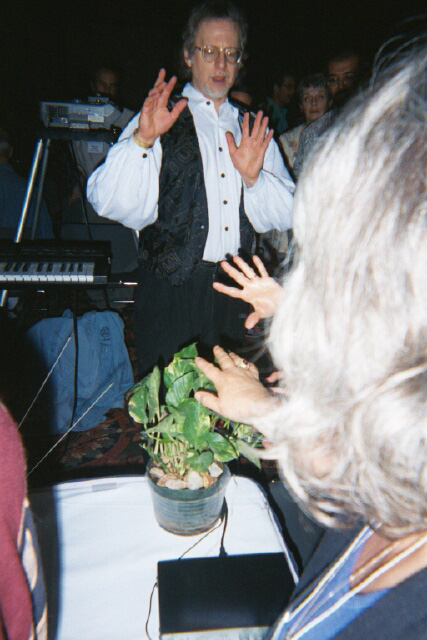
I attended a workshop on "Harnessing the Healing Power of Music" by Steven
Halpern this spring at the International Conference on Science and
Consciousness. I had only the vaguest awareness of what kind of music he
composed and recorded, and was eager to learn how he felt about the "Mozart
Effect" -- the idea that classical music can enhance concentration,
relaxation, and intellectual development in people who listen to it. I was
not to be disappointed.
Halpern began his workshop by playing one of his compositions and asking,
"This music helps people experience inner peace... but where is the melody?
Where is the beat?"
Indeed... the melody of his song was difficult to pin down, and there
was no discernable beat.
Rhythm Entrainment
Halpern then demonstrated the phenomenon known as rhythm
entrainment, in which an external stimulus can override our internal
rhythm. I can actually feel my heart beat faster when the rhythm of the
music I am listening to speeds up. When the rhythm of the music slows
down, my heart beat slows down, too.
I was thrilled to learn this. Finally, there is an explanation for why my
young daughters feel compelled to race around the house any time I play the
1812 William Tell Overture. Their hearts start racing when they hear the
rhythm change from the calm introduction of the tune to the urgent call to
arms -- and they feel a wild compulsion to jump on their hobby horses and
ride like the wind!
The absence of an obvious beat in Halpern's music allows each listener's
heartbeat to relax into its own natural rhythm.
Mozart Effect
But what about the so-called Mozart Effect... the phenomenon responsible
for sending so many people out in search of the perfect classical recording
for making their children and themselves smarter?
Halpern continued to explain that rhythm entrainment doesn't just happen
with music, but that everything in our external environment (TV,
radio, people talking, city noise) has the ability to alter our bodily
rhythms. While resonance can create healing in us, Halpern was quick to
point out that "Most of what we experience in the material world is not for
our own healing and balance."
Anyone awakened to the jolting sound
of a jack-hammer or garbage truck already knows this to be true!
Music's Healing Powers
Halpern also shared with us the American Medical Association's politically
correct and legally safe position on music's effects on people: "Music
assists the body to heal itself". This statement is quite different from,
"This piece of music will heal you" -- since every person responds uniquely
to music. We each have a responsibility to ourselves to discover what kind
of listener we are.
Halpern played two recordings of Bach's to
illustrate this point for us... two different versions of the same song can
sound completely different, and have vastly different effects on the
listener!
Halpern began to play musical scales on the piano (a series of chords and
notes that rise in predictable fashion), and then asked, "How many of you
are holding your breath?" Most of us laughed, as we realized it was true
-- we were holding our breath as the sequence of notes rose and we
anticipated what might be played next! "A lot of music holds your breath
hostage", explained Halpern, "Chords will do the same thing. You feel a
tension if you know what's supposed to happen and if a piece is played
differently than you anticipate, tension results".
Free from the Conspiracy
Have you ever noticed how some people use background music as a kind of
room freshener to conceal disturbing environmental sounds, often achieving
very different results from what they are intending? Most people tend to
assume that classical music is ideal background music for studying or other
mental work, because it lacks the pounding beats typical of the built-in
tension found in pop and rap music. Halpern had just proved this
assumption to be untrue, since classical pieces can be so distracting that
they take our breath away. He demonstrated the healing, uplifting quality
of his compositions by playing "Spectrum Suite", which is designed to
gently stimulate each of the body's chakras -- and left me feeling
energized and exquisitely relaxed.
Halpern played some more of his songs that omit catchy melodies, chord
progressions and pounding beats. Halpern's music facilitates easy
absorption of information in a state of relaxed awareness -- ideal for
mediation or background music that doesn't drive one to distraction. "Our
bodies are healed in a state of deep relaxation", said Halpern. "We're
hard-wired for coherence and balance, and most of that happens with sound".
Halpern defined conspiration as "breathing together". It occurred to me
after Halpern's workshop that people who believe Mozart (and other
classical music) to be superior to all other music are indeed "breathing
together" as they anticipate the next parts of the melody. This can often
be a wonderful experience, as people share feelings through music... and as
we know what we're doing to our bodies as we select the music we choose to
listen to.
Even Steven Halpern admits he enjoys listening to many different kinds of
music at various times -- as most of us do. It makes such a difference
when we start paying attention to how music affects us, and select the
music that best suits our needs.
I'm relieved to learn this priceless lesson about music that sets my
breathing... and every cell in my body... free.
.............
Are you curious to learn more about music that helps you feel more
energized and relaxed without adding to your levels of stress? You can
satisfy that craving by visiting Stephen Halpern's excellent web site
at:
http://www.stevenhalpern.com/
Steven Halpern's Inner Peace Music
"Listening to Steven's music is like getting a birthday present from an old
friend that you didn't even know had your address."
Experience the benefits of effortless relaxation and inner peace for
yourself.
..........
Home
/ News / Articles
/ Bookshelf
Your
Stories